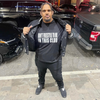Houston Club-Rap Hero BeatKing’s Raucous Spirit Still Flows Through His City
Reflecting on the past, present, and future of Houston’s club-rap scene now that its most colossal voice is gone

For more than a decade, you could go to any club in Houston—from the Northside to the Southside, Third Ward, and Southwest—and hear BeatKing’s voice and beats cracking through like Dionysus spurring debauchery from above. He was the self-proclaimed Club God, and he lived up to that title. Like 2 Live Crew’s Uncle Luke, he offered hedonistic fun to those who worshiped at his altar of blunt production, wild non-sequiturs, and raucous call-and-response: “Welcome to Houston, everybody fuckin’ everybody” and “If you keep your pussy clean, then scream” and “Pop that ass, throw it/Kill the pussy, COVID.” (His signature 150-point Impact font tees doubled down on the crude quotables: “SHE THICK IF HER TOILET SEAT LOOSE.”) He was the Chuck D of booty-shaking acrobatics. He was also a generous member of the scene known for extending a hand to nearly every DJ in the city.
Houston is sadly accustomed to losing its artists before their time, whether by incarceration or death. But even amid that swampy haze of grief, the passing of the man born Justin Riley from a pulmonary embolism last summer—just three months shy of his 40th birthday—was an especially harsh blow.
BeatKing’s lasting presence is an argument for regional legacy. He never had a legit nationwide hit but his songs still collected more than 150 million streams online as they became synonymous with late nights and random parties in his hometown and beyond. He had a viral moment in 2020 when “Then Leave,” a collaboration with fellow Houstonite Queendom Come, exploded on TikTok, but it didn’t define him; he’s a cult figure who levitates on holier ground.




